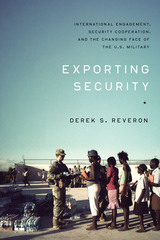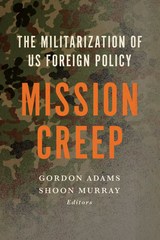
In a very short time, individuals and companies have harnessed cyberspace to create new industries, a vibrant social space, and a new economic sphere that are intertwined with our everyday lives. At the same time, individuals, subnational groups, and governments are using cyberspace to advance interests through malicious activity. Terrorists recruit, train, and target through the Internet, hackers steal data, and intelligence services conduct espionage. Still, the vast majority of cyberspace is civilian space used by individuals, businesses, and governments for legitimate purposes.
Cyberspace and National Security brings together scholars, policy analysts, and information technology executives to examine current and future threats to cyberspace. They discuss various approaches to advance and defend national interests, contrast the US approach with European, Russian, and Chinese approaches, and offer new ways and means to defend interests in cyberspace and develop offensive capabilities to compete there. Policymakers and strategists will find this book to be an invaluable resource in their efforts to ensure national security and answer concerns about future cyberwarfare.

Given U.S. focus on the continuing wars in Iraq and Afghanistan, it is easy to miss that the military does much more than engage in combat. On any given day, military engineers dig wells in East Africa, medical personnel provide vaccinations in Latin America, and special forces mentor militaries in southeast Asia.
To address today's security challenges, the military partners with civilian agencies, NGOs, and the private sector both at home and abroad. By doing so, the United States seeks to improve its international image, strengthen the state sovereignty system by training and equipping partners’ security forces, prevent localized violence from escalating into regional crises, and protect U.S. national security by addressing underlying conditions that inspire and sustain violent extremism.
In Exporting Security, Derek Reveron provides a comprehensive analysis of the shift in U.S. foreign policy from coercive diplomacy to cooperative military engagement, examines how and why the U.S. military is an effective tool of foreign policy, and explores the methods used to reduce security deficits around the world.

Mission Creep: The Militarization of US Foreign Policy? examines the question of whether the US Department of Defense (DOD) has assumed too large a role in influencing and implementing US foreign policy. After the Cold War, and accelerating after September 11, the United States has drawn upon the enormous resources of DOD in adjusting to the new global environment and challenges arising from terrorism, Islamic radicalism, insurgencies, ethnic conflicts, and failed states.
Contributors investigate and provide different perspectives on the extent to which military leaders and DOD have increased their influence and involvement in areas such as foreign aid, development, diplomacy, policy debates, and covert operations. These developments are set in historical and institutional context, as contributors explore the various causes for this institutional imbalance. The book concludes that there has been a militarization of US foreign policy while it explores the institutional and political causes and their implications.
“Militarization” as it is used in this book does not mean that generals directly challenge civilian control over policy; rather it entails a subtle phenomenon wherein the military increasingly becomes the primary actor and face of US policy abroad. Mission Creep’s assessment and policy recommendations about how to rebalance the role of civilian agencies in foreign policy decision making and implementation will interest scholars and students of US foreign policy, defense policy, and security studies, as well as policy practitioners interested in the limits and extents of militarization.

Safe from the battlefields of Europe and Asia, the United States led the post–World War II global economic recovery through international assistance and foreign direct investment. With an ardent decolonization agenda and a postwar legitimacy, the United States attempted to construct a world characterized by cooperation. When American optimism clashed with Soviet expansionism, the United States started on a path to global hegemony.
In US Foreign Policy and Defense Strategy, the authors analyze the strategic underpinnings of hegemony, assess the national security establishment that sustains dominance, consider the impact on civil-military relations, and explore the intertwining relationships between foreign policy, defense strategy, and commercial activities. Eschewing conventional analyses, the volume not only identifies drivers and continuities in foreign policy, but it also examines how the legacy of the last sixty-five years will influence future national security policy that will be characterized by US leadership in an increasingly competitive world.
From civil-military relations to finance, and from competing visions of how America should make war to its philosophy of securing peace through reconstruction and reconciliation, US Foreign Policy and Defense Strategy offers unique insights into the links between military and commercial power as it charts the rise of a historical rarity: the incidental superpower. This accessibly written book is suitable for students and general readers as well as scholars.
READERS
Browse our collection.
PUBLISHERS
See BiblioVault's publisher services.
STUDENT SERVICES
Files for college accessibility offices.
UChicago Accessibility Resources
home | accessibility | search | about | contact us
BiblioVault ® 2001 - 2024
The University of Chicago Press









